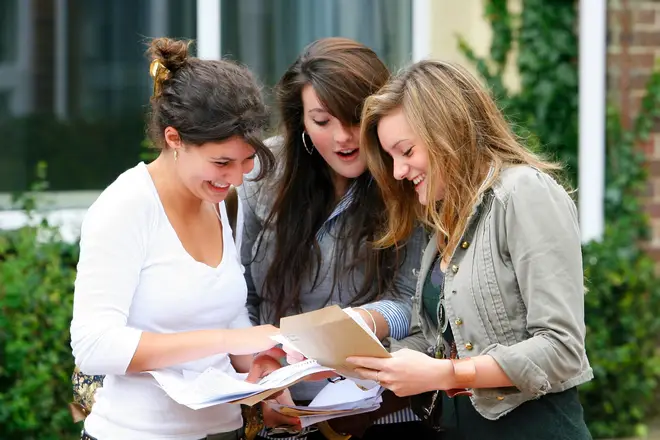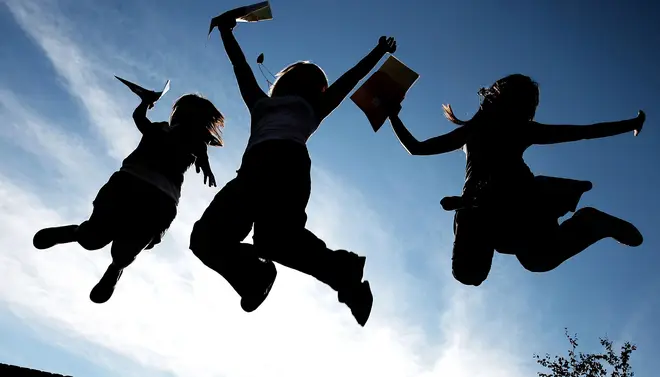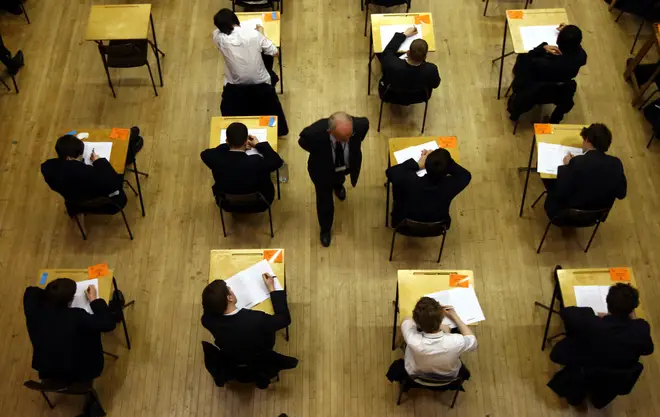
James O'Brien 10am - 1pm
4 August 2020, 08:51

Pass rates have increased in Scotland but thousands of grades were lowered by officials after the coronavirus pandemic forced the cancellation of exams for the first time ever.
More than 130,000 pupils are receiving their grades for Nationals 4 and 5 - the equivalent to GCSEs in England - and Highers and Advanced Higher courses, the school-leaver exams similar to A-levels.
Like in other parts of the UK, pupils’ grades in Scotland were based on their teachers’ predictions this year and moderated by the regulator, judged by their previous performance in assessments.
The 2020 summer exam season was axed across Britain when schools closed in March.
Official statistics released on Tuesday morning show the National 5 pass rate was 81.1%, the Higher pass rate was 78.9% and the Advanced Higher pass rate was 84.9%.
In 2019, the National 5 pass rate was 78.2%, the Higher pass rate was 74.8% and the Advanced Higher pass rate was 79.4%.
But around 133,000 grades were adjusted from the initial estimate, around a quarter of all entries - 6.9% of those were adjusted up and 93.1% down, with 96% of all adjusted grades changed by one grade.
Many exam boards are expecting an influx of appeals and complaints from students who have narrowly missed out on college and university places and feel their teachers’ grades are unfair.

Officials in England, Wales and Northern Ireland will be watching closely ahead of A-level results day on 13 August and GCSEs on 20 August.
Those who signed up to text or email alerts began receiving their grades at 8am and certificates will arrive in the post - a shift from the usual congregation of hundreds of pupils to open envelopes at schools.
Meanwhile, a total of 28,970 students from Scotland have been accepted into university or college through the Universities and Colleges Admissions Service (Ucas), up 220 on exam results day last year.
Ucas said that of those accepted, 28,240 will be studying in Scotland - an increase from 27,880 in 2019.
Some 23.9% of all 18-year-olds in Scotland are due to enter higher education this year (12,700 students), up 0.6 percentage points and a new record for SQA results day.

Can you trust the government over school re-opening, asks James O'Brien
The number of 18-year-olds from Scotland's most deprived areas with a confirmed place has risen to a new high of 1,300 - meaning 11.9% of all young people belonging to this group have been accepted into university or college.
Ucas said acceptance numbers will rise in the coming days and weeks as more students' places are confirmed.
One pupil, 16, receiving her Nationals results - two As, two Bs and a C - told LBC: "It was weird because normally you'd know if you'd done OK or if you'd done bad, through how much you did in the exam, but because you don't even know what they were using for their evidence... you don't know what you were going to wake up to."
Another pupil, 15, told LBC after receiving her Nationals: "I would have preferred to have sat [the exams] because it was really stressful not really knowing how the grades were going to be [decided] and how you'd done."
"I was really nervous, I'd known how my course work was but I didn't expect to get the results I got, I was really stressed out," she added.
Speaking after exam results were published in Scotland, Deputy First Minister John Swinney said: "In the face of an incredibly tough few months for pupils and teachers, we can today celebrate the achievements of all learners.
"Young people have received awards that recognise their hard work and allow them to move onto the next stage in their lives.
"Scottish exams have never before been cancelled. I am immensely grateful to all teachers and lecturers who worked incredibly hard to assess achievement this year, and to the SQA for developing the certification model - without either, young people could not have received qualifications."
With exams cancelled, teachers were asked to put pupils into bands of grades. These were then submitted to Scottish Qualifications Authority (SQA) to check they weren’t inflated.
Teachers based their estimates on classwork, prelims, past papers or class tests.
The SQA said grades had been moderated “where appropriate” to “maintain national standards”.
READ MORE: Students can sit exams if they aren't happy with teachers' grades
READ MORE: GCSE English literature and history pupils can skip exam topics next year

Some have raised fears that the system will unfairly penalise those pupils’ who overperformed in previously low-performing schools, but the SQA said it had sought to “uphold the integrity and credibility” of the qualifications to “ensure fairness for all learners”.
If things don’t turn out as expected, the first step is to appeal your grade.
This process is free this year, but you can only appeal through your school.
Appeals must be based on your awarded grade being lower than the original grade estimated by your teacher, accompanied with evidence to show you were performing in line with the estimated grade.
If you disagree with your estimated grade, you need to speak to your school or college, the SQA said.
The SQA said it expects it to be “very rare” that grades would go down following an appeal, but this is still possible.
In any case, the SQA advise that you can sit exams next year and choose whichever grade is highest - although it is not yet clear how disrupted next year’s exams will be.
The Ucas clearing window is now open until 20 October, with many universities across the UK having thousands of courses still up for grabs.
Experts have predicted buyer’s choice for university applicants this year given so many institutions are desperate for home students amid an expected plummet in overseas arrivals.
You can search for a clearing course via the Ucas website here.